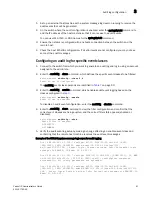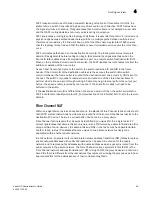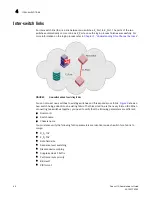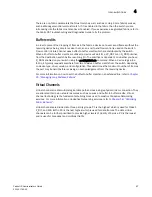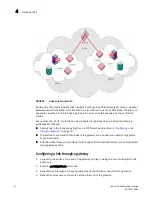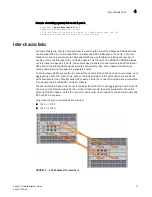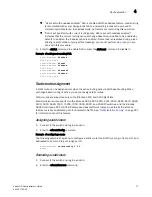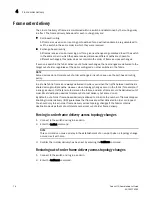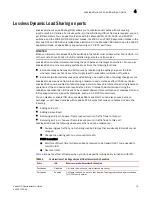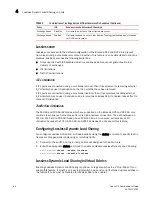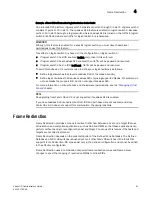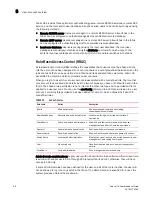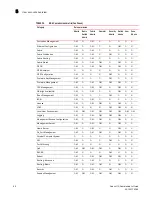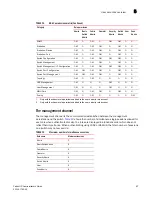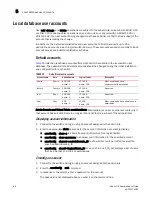
Fabric OS Administrator’s Guide
73
53-1001763-02
Routing policies
4
If one ICL is broken but there is a regular ISL, the triangular topology still holds given the ISL cost is
lower than the total cost through the ICL linear topology. If a direct ICL link between two switches is
broken the triangular topology is considered broken when the ISL path between the two switches is
a multiple hop. In this case the triangular topology broken message will still be posted independent
of the cost of the ISL path being lesser or greater than the ICL path between the two switches.
Refer to the
Brocade DCX Backbone Hardware Reference Manual
and the
Brocade DCX-4S
Backbone Hardware Reference Manual
for instructions on how to cable ICLs.
FIGURE 11
ICL triangular topology
Virtual Fabrics considerations: In Virtual Fabrics, the ICL ports can be split across the logical
switch, base switch and default switch. The triangular topology requirement still needs to be met
for each fabric individually. The present restriction on ICL being part of only logical switches with
“Allow XISL Use” attribute off still applies.
Routing policies
By default, all routing protocols place their routes into a routing table. You can control the routes
that a protocol places into each table and the routes from that table that the protocol advertises by
defining one or more routing policies and then applying them to the specific routing protocol.
The routing policy is responsible for selecting a route based on one of two user-selected routing
policies:
•
Port-based routing
•
Exchange-based routing
On the Brocade 300, 4100, 4900, 5000, 5410, 5424, 5450, 5460, 5470, 5480, 5100, 5300,
5424, 7500, 7500E, 7600, 7800, 8000, and VA-40FC switches, the Brocade 48000 director, and
the Brocade DCX and DCX-4S enterprise-class platforms (all 4 Gbps ASICs and later) routing is
handled by the FSPF protocol and either the port-based routing or exchange-based routing policies.
ICL 3
ICL 1
ICL 2
Chassis 2
Chassis 1
Chassis 3
Summary of Contents for 53-1001763-02
Page 1: ...53 1001763 02 13 September 2010 Fabric OS Administrator s Guide Supporting Fabric OS v6 4 0 ...
Page 4: ...iv Fabric OS Administrator s Guide 53 1001763 02 ...
Page 24: ...xxiv Fabric OS Administrator s Guide 53 1001763 02 ...
Page 28: ...xxviii Fabric OS Administrator s Guide 53 1001763 02 ...
Page 32: ...xxxii Fabric OS Administrator s Guide 53 1001763 02 ...
Page 40: ...xl Fabric OS Administrator s Guide 53 1001763 02 ...
Page 42: ...2 Fabric OS Administrator s Guide 53 1001763 02 ...
Page 54: ...14 Fabric OS Administrator s Guide 53 1001763 02 High availability of daemon processes 1 ...
Page 74: ...34 Fabric OS Administrator s Guide 53 1001763 02 Basic connections 2 ...
Page 102: ...62 Fabric OS Administrator s Guide 53 1001763 02 Audit log configuration 3 ...
Page 214: ...174 Fabric OS Administrator s Guide 53 1001763 02 Management interface security 7 ...
Page 228: ...188 Fabric OS Administrator s Guide 53 1001763 02 Brocade configuration form 8 ...
Page 276: ...236 Fabric OS Administrator s Guide 53 1001763 02 Creating a logical fabric using XISLs 10 ...
Page 404: ...364 Fabric OS Administrator s Guide 53 1001763 02 ...
Page 440: ...400 Fabric OS Administrator s Guide 53 1001763 02 Performance data collection 17 ...
Page 480: ...440 Fabric OS Administrator s Guide 53 1001763 02 F_Port masterless trunking 19 ...
Page 494: ...454 Fabric OS Administrator s Guide 53 1001763 02 Buffer credit recovery 20 ...
Page 574: ...534 Fabric OS Administrator s Guide 53 1001763 02 Hexadecimal overview E ...



